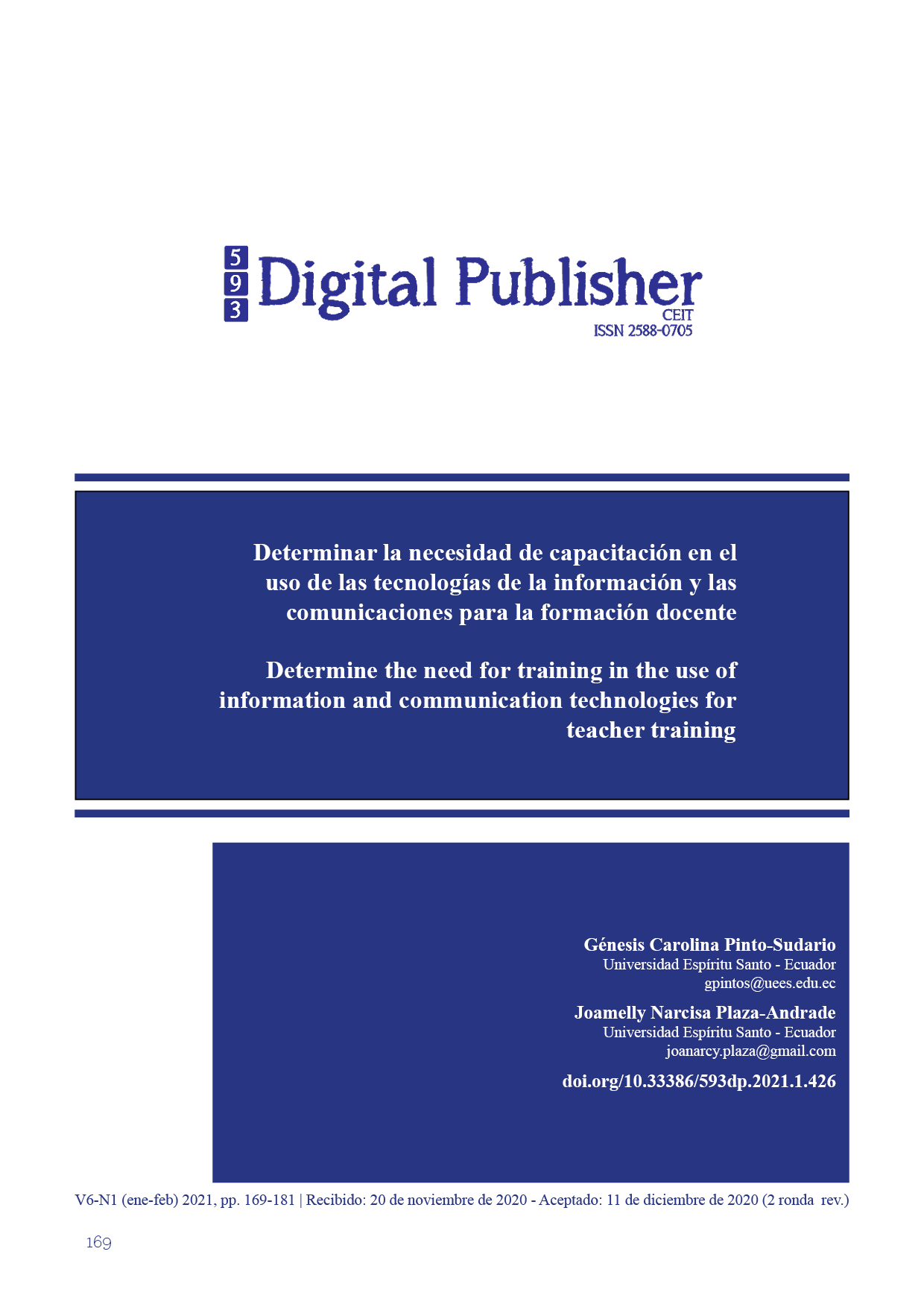Determine the need for training in the use of information and communication technologies for teacher training
Main Article Content
Abstract
This work aims to determine the need for training in the use of information and communication technologies (ICT), by which teachers, when they are in the technological boom that currently governs, has become a main tool that is necessary for personal and professional use. Likewise, the management of virtual environments that are used in teaching work, in addition the need to use learning platforms provided to teachers to improve academic work has been perceived, the empowerment that the teacher demonstrates towards these also adds to this need technology and facilitate active learning in teachers for their professional training, developing pedagogical and technical skills. Theoretical systematization methods were used and the empirical method that was developed through surveys and interviews with teachers of the Tungurahua Province Fiscal Educational Unit, at the same time the criteria of experts were applied for data collection. This research contributes to the development of a training plan for teachers in the educational institution where the need for the use of ICT has been determined.
Downloads
Article Details

This work is licensed under a Creative Commons Attribution-NonCommercial-ShareAlike 4.0 International License.
1. Derechos de autor
Las obras que se publican en 593 Digital Publisher CEIT están sujetas a los siguientes términos:
1.1. 593 Digital Publisher CEIT, conserva los derechos patrimoniales (copyright) de las obras publicadas, favorece y permite la reutilización de las mismas bajo la licencia Licencia Creative Commons 4.0 de Reconocimiento-NoComercial-CompartirIgual 4.0, por lo cual se pueden copiar, usar, difundir, transmitir y exponer públicamente, siempre que:
1.1.a. Se cite la autoría y fuente original de su publicación (revista, editorial, URL).
1.1.b. No se usen para fines comerciales u onerosos.
1.1.c. Se mencione la existencia y especificaciones de esta licencia de uso.
References
Adegbenro, J., Gumbo, M., & Olakanmi, E. (2017). In-Service Secondary School Teachers’ Technology Integration Needs in an ICT-Enhanced Classroom. TOJET: The Turkish Online Journal of Educational Technology – July, volume 16 issue 3, 79-87.
Araiza, M. (2011). Una Mirada Crítica a la Formación Docente en la Integración de las Tecnologías de la Información y la Comunicación en el Proceso de Enseñanza. Daena: International Journal of Good Conscience, 241-252.
Ávila, G., & Huerta, M. (2020). Formación del docente en el bachillerato del IPN, ante los retos en uso de las TIC en la enseñanza de física. Revista Multidisciplinaria de Avances de Investigación ISSN:, 14-22.
Ávila, G., & Huerta, M. d. (2020). Formación del docente en el bachillerato del IPN, ante los retos en uso de las TIC en la enseñanza de física. Revista Multidisciplinaria de Avances de Investigación ISSN:, 14-22.
Barbosa, S. I. (11 de Abril de 2020). Tesis para optar al título de Magister en Informática Educativa. Formación docente para el desarrollo de la competencia tecnológica a través de un ambiente de aprendizaje mediado por tic en los docentes del seminario mayor. Chía, Colombia.
Bedoya, J. R., Betancourt, M. O., & Villa, F. L. (2018). Creación de una comunidad de práctica para la formación de docentes en la integración de las TIC a los procesos de aprendizaje y enseñanza de lenguas extranjeras. Revista de Lenguaje y Cultura, 121-139.
Behar, D. (2008). Metodología de la Investigación. Shalom.
Bermúdez Carrillo, L. (2015). Capacitación: una herramienta de Fortalecimiento de las pymes. Revista Electrónica de las Sedes Regionales de la Universidad de Costa Rica, 1-25.
Bohórquez Cruz, N. (Septiembre de 2017). Trabajo de titulación que se presenta como requisito previo a optar el grado de ing. en ciencias empresariales. Impacto de las tic en instituciones educativas: públicas y privadas en ecuador. Samborondon, Samborondon, Ecuador.
Cadena, M. O., Carvajal, B. F., Céceres , L. C., & Ortíz, J. A. (2018). Percepción y uso de las tecnologías de la información y comunicación por parte de la población adulta mayor. Revista ACGG, 27-38.
Chiavenato, I. (2011). Administración de recursos humanos. México, D.F. Novena Edición: McGrawHill Educación.
Cruz, M. D. (2020). Formación continúa del docente como factor de la calidad educativa universitaria. Revista Científica Internacional, 73-79.
Delgado, E., Lema, B., & Alzate, L. (2017). CAPACITACIÓN DOCENTE EN EL USO DE LAS TIC’S. IPLAC Publicación Latinoamericana vol. 1 n.1, 41-48.
Gómez, M., Corral , S., & Sayavedra, M. (2015). Aplicación de tac en la enseñanza: una propuesta de capacitación docente. Signos universitarios no. 1., 161-169.
Henríquez, G., Veracoechea, B., Papale, J. F., & Berrios, A. T. ( 2015). Modelo de capacitación docente para entornos virtuales de aprendizaje. Caso decanato ciencias de la salud de la UCLA. RIED v. 18: 1., 67-90.
Henríquez, G., Veracoechea, B., Papale, J., & Berrios, A. (2015). Modelo de capacitación docente para entornos virtuales de aprendizaje. Caso decanato ciencias de la salud de la UCLA. Iberoamericana de Educación a distancia vol. 18, núm. 1., 67-90.
Hernández, R., Fernández, C., & Baptista, M. d. (2014). Metodología de la investigación. México: McGRAW-HILL / INTERAMERICANA EDITORES, S.A. DE C.V.
Hernández, R., Orrego, R., & Quiñonez, S. (2018). Nuevas formas de aprender: La formación docente formación docente. Propósitos y Representaciones Vol. 6, Nº 2, 671-701.
Izarra Vielma, D., Hirsch Adler, A., & Rodríguez León, M. (2020). Profesorado de posgrado y el desarrollo del pensamiento crítico. Innovación Educativa, vol. 20, número 83, 166.
Levis, D. (2008). FORMACIÓN DOCENTE EN TIC: ¿EL HUEVO O LA GALLINA? Razón y Palabra, núm. 63, 16.
LOEI. (2016). Ley Orgánica de Educación Intercultural. Quito.
López, M., & Chávez, J. (2013). La formación de profesores universitarios en la aplicación de las TIC. Electrónica Sinéctica, 1-18.
Machado, M., & Perilla, A. (2020). Tecnologías de información y comunicación (tic) como recurso alternativo en educación secundaria a distancia. Revista de Investigación en Gestión Industrial, Ambiental,Seguridad Y Salud En El Trabajo – GISST, 5-34.
Malbernat, L. (2014). Capacitación docente: Propuesta para incorporar TIC en educación superior. RedUNCI, 174-183.
Mirete Ruiz, A. (2010). FORMACIÓN DOCENTE EN TICS. ¿ESTÁN LOS DOCENTES PREPARADOS PARA LA (R)EVOLUCIÓN TIC? Red de Revistas Científicas, 35-44.
Mocanu, E., & Deaconu, A. (2017). The use of information and communication technology (ICT) as a teaching method in vocational education and training in tourism. ACTA DIDÁCTICA NAPOCENSIA Volume 10 Number 3, 19-34.
Morales, O. S., & Leguizamón, M. C. (2018). Teoría andragógica: aciertos y desaciertos en la formación docente en TIC. Praxis & Saber, vol. 9, núm. 19, 161-181.
Moreno, A. (2015). Enfoques de la Formación Docente. Ra Ximhai, 511-518.
Quiroga, G., & Eines, M. (2015). La incorporación de las TIC en la virtualidad de las distintas modalidades del aprendizaje en la UNdeC. En X Congreso sobre Tecnología en Educación & Educación en Tecnología (TE & ET) Corrientes 2015, 227-238.
Roldán López, N. (2007). Capacitación de docentes competentes en diseño instruccional. Revista Virtual Universidad Católica del Norte Norte, núm. 20, febrero-abril, 2007., 1-16.
Ruiz, A., Medina, M. d., Pérez, E., & Medina, A. (2020). University teachers’ training: the Digital Competence. PIXEL-BIT REVISTA DE MEDIOS Y EDUCACIÓN Nº 58 _MAY https://recyt.fecyt.es/index.php/pixel/index, 182-215.
Siemens, G. (2004). Conectivismo: Una teoría de aprendizaje para la era digital. Creative Commons 2.5, vol. 15, 10.
UNESCO. (2013). Oficina Regional de Educación para América Latina y el Caribe OREALC/UNESCO Santiago, 58.
Valdés, A., Angulo, J., Urías, M., García, R., & Mortis, S. (2011). Necesidades de capacitación de docentes de educación básica en el uso de las TIC. de Medios y Educación Píxel-Bit. Nº 39, 211 - 223.



